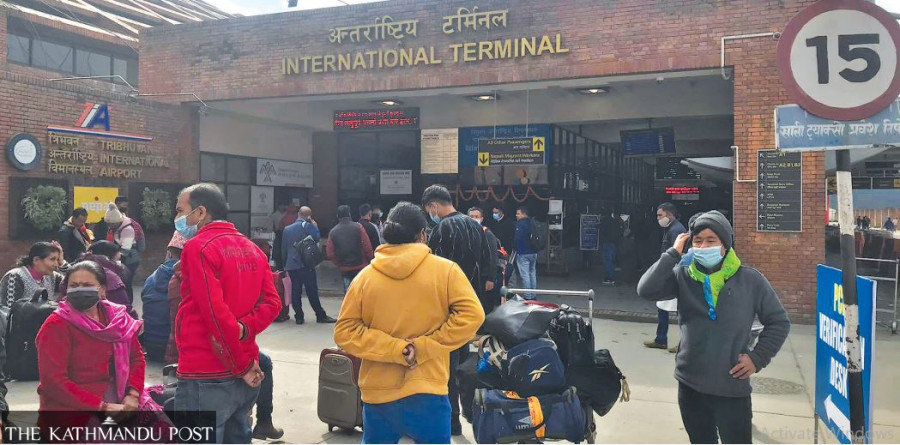Health
Work on holding centres started before second Covid wave yet to be completed
Public health experts say everyone returning from abroad should be mandatorily quarantined for 14 days.
Arjun Poudel
Amid fears of the highly contagious Omicron variant of Covid-19 spreading in Nepal, public health experts have stressed the need for a mandatory 14-day quarantine for everyone returning from abroad.
However, the work on the holding centers that the government had decided to set up in all provinces, mostly at Nepal-India border points, before the start of the second wave in April have not yet been completed.
And what is concerning is the authorities concerned have yet to find land for setting up a quarantine centre in Rupendehi district of the Lumbini Province.
“None of the holding centers has been completed yet,” Sunita Nepal, spokesperson for the Covid-19 Crisis Management Coordination Center, told the Post.
After the second wave of the Pandemic hit India in March, the government has decided to set up 1,000-bed holding centers in all seven provinces and in the Kathmandu Valley. The Nepal Army was assigned the task.
“Work is ongoing to complete the construction of holding centers,” Brigadier General Santosh Ballave Poudyal, spokesperson for the Nepal Army, told the Post. “Up to 76 percent of the construction has been completed in some holding centers so far.”
Poudyal concedes that the army has not been able to find a place to set up quarantine in Rupandehi district.
Public health experts say holding centers and quarantine facilities are crucial, as the risk of spread of the Omicron variant of the coronavirus has grown especially after new cases were found in India. With the porous over 1,800-km border with India, it was only a matter of time that cases would enter Nepal, experts say.
When the first and the second wave of the pandemic hit India, hundreds of thousands of Nepali migrant labourers returned home from India. The infection had spilled over in communities, due to poor screening at border points and the lack of holding centers to quarantine the returnees.
“We should focus on border management,” Dr GD Thakur, former director at the Epidemiology and Disease Control Division, told the Post. “People returning home from abroad should be placed in mandatory quarantine. Our past experience shows that monitoring of the people placed in home quarantine may not be effective so if possible authorities should place them at holding centers or institutional quarantine facilities.”
Experts as well as officials at the Health Ministry say the Nepali authorities have the habit of starting digging wells only after a fire breaks out.
“They were never serious towards the risks and are still not serious,” an official at the Health Ministry, told the Post, asking not to be named, as he feared retribution for speaking to the media. “Had they been serious, dozens of holding centers would have been ready by now.”
Besides several African countries, the Omicron variant has been confirmed in at least 40 countries including the United States of America, India, Japan, Sri Lanka, Singapore, South Korea, Malaysia, Israel and the United Arab Emirates where thousands of Nepalis work and live and many of them travel to Nepal.
“It has been proved that the new variant is highly mutant and highly contagious,” Dr Prabhat Adhikari, an infectious disease and critical care expert, told the Post. “As we have been saying repeatedly that the authorities should start preparations for the worst case scenario.”
He said that health authorities should start preparing health workers to deal with a possible surge in new cases, increase the number of hospital beds, set up quarantine and isolation centers and start arranging oxygen and medicines for the treatment of the infected.
“In the first wave of the pandemic, we had set up more quarantine and isolation centers and placed people in quarantine, which helped to slow down the infection rate and the loss of lives was less compared to the second wave,” said Adhikari. “In the second wave, we did not pay attention to those things and we faced the consequences.”
During the second wave of the pandemic, the government had converted some hotels and party venues in Kathmandu into holding centres to quarantine Nepalis returning from abroad, and the responsibility of ensuring security at those holding centers was assigned to the Nepal Army.
Meanwhile, the Ministry of Health and Population said that no new decision has been taken as preventive measures to prevent the virus variant from entering the country.
“Everyone knows, it is not possible to block the virus variant from entering the country,’ an official at the Health Ministry said, asking not to be named. “The only question is how soon it will arrive.”
Earlier, a Cabinet meeting had decided to ban entry of passengers arriving or transiting from nine countries—South Africa, Botswana, Zimbabwe, Namibia, Lesotho, Eswatini, Mozambique, Malawi, and Hong Kong.
When asked if the government restricts entry from other countries also, as the Omicron variant has already been detected in at least 40 countries, Health Ministry’s joint spokesperson Dr Samir Kumar Adhikari said no new decision has been taken so far.
“Such a decision can be taken by the Cabinet,” Adhikari said




 11.84°C Kathmandu
11.84°C Kathmandu















